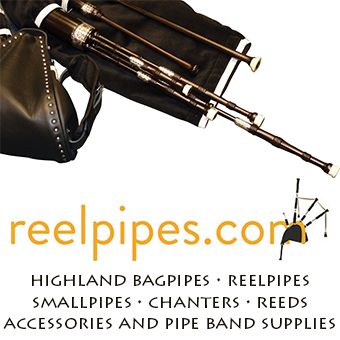
2021 certainly got off to a mixed start for piping. In Scotland, it seemed that no sooner had Pipe Major Peter MacGregor (4 SCOTS) sounded the last notes of When the Battle’s Over from the ramparts of Edinburgh Castle than we lost some weel kent names: Nigel Richard, Dr. Peter Cooke and Pipe Major Tony Crease. Their deaths came only a couple of weeks after we lost Pipe Major Iain Morrison and Sandy Grant Gordon. What a contribution to piping these individuals made! We will miss all of them.
For Peter MacGregor, though, the 38-year-old Wester Ross piper’s Hogmanay performance was something of a regimental affair. For his solo spot, Peter had borrowed Pipe Major Alasdair Gillies’ silver and ivory set of Lawries (early 1900s) to which we understand he put a set of Bruce Hitchings’ highly rated HR drone reeds in. As we all heard, it was a beautiful sound. It was a super way to end a terrible year and to bring in a new one with optimism (albeit tinged with a degree of trepidation over whether we’ll have a piping season …).
4 SCOTS is, properly, the 4th Battalion The Royal Regiment of Scotland. Before the Options for Change defence review of the early 1990s, it was known as The Queen’s Own Highlanders. Bruce Hitchings was Pipe Major of the Queen’s Own Highlanders from 1986 to 1992 and he handed over to Alasdair Gillies that year.
Our recent serialisation of Angus MacPherson’s life in pipe has proven popular with readers around the world. Many of you commented on his recollections being so close (Dr. John MacAskill’s interviewing with Angus was only in 1970) yet recalling how his father knew pipers like Angus MacKay, who died, remember, in 1859.

Roddy Livingstone, London, England, in particular read with interest the references to Angus MacRae and Angus both having success “in London“. The dates Angus referred to were well before the formation of the Scottish Piping Society of London (1932) and the inception of its annual competition. Says Roddy: “The references are, I believe, to the games held annually before the First World War at Stamford Bridge (the home of the London Athletic Club & later Chelsea Football Club).
“It is unsurprising that there were games in London during this period as many of the Scots ‘gentry’ spent a good part of the year in London accompanied by their pipers. (David Ross gave a clear account of these facts in a lecture delivered to the SPSL in the early 1960s and later published).
“It would be most interesting to try to trace any records of these early competitions held in the south of England. I don’t think I have ever seen anything much in writing but surely the results would have been reported – perhaps either in the Oban Times or in the papers of the Highland Society of London. It is recorded (although I can’t remember exactly where) that winners of the juvenile events at Stamford Bridge in the early 1890s included George S. McLennan and Archibald Campbell of Kilberry.
“I was also reminded of the story that when Willie Ross was asked how he rated Angus MacPherson as a piper, he is reputed to have replied, ‘Man, he’s the finest highland dancer I’ve ever seen.’ Another one of the great Willie Ross jibes!”
Thanks Roddy. Can readers help? It would indeed be interesting to find out more of these early competitions? Please contact us in the usual way.


